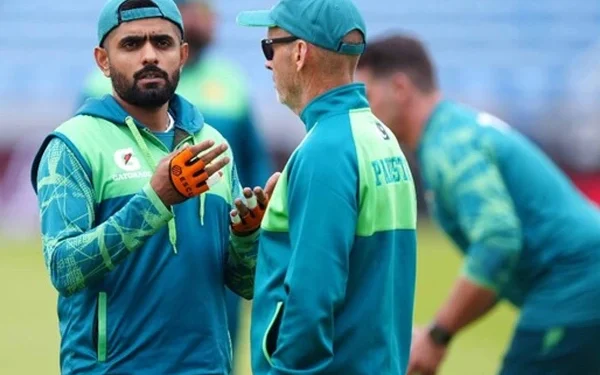Lahore, Pakistan – Former South African cricketer and renowned coach Gary Kirsten has finally broken his silence on why he decided to step down from his role as head coach of Pakistan’s white-ball cricket team. Speaking candidly on the Wisden Cricket Patreon Podcast, Kirsten revealed a combination of internal politics, lack of autonomy, and interference from the selection committee made his job as coach not only difficult but ultimately unworkable.
The statement has sparked considerable debate in Pakistan’s cricketing circles, particularly around the persistent issue of external interference in cricket team management, a challenge that has plagued the Pakistan Cricket Board (PCB) for years.
A Promising Start That Turned Rocky
Gary Kirsten, who is widely respected in international cricket for leading India to their 2011 ICC World Cup victory, took on the role of head coach for Pakistan’s white-ball (ODI and T20I) team in April 2024. His appointment came with much fanfare, as fans and analysts alike hoped his experience and calm demeanor would bring a much-needed sense of stability and strategy to a team known for its inconsistency.
However, within six months, Kirsten tendered his resignation, leaving many surprised. While rumors circulated about internal disagreements, lack of communication, and resistance from within the PCB, Kirsten had remained silent—until now.
Kirsten Speaks Out: “Nothing Left for Me as a Coach”
In his interview with Wisden, Kirsten detailed the struggles he faced from the outset.
“If the team’s selection committee removed my name and made the playing XI, then there was nothing left for me as a coach,” said Kirsten.
“I realized very quickly that I would not be allowed to work here. It became very difficult to make any kind of positive impact on the group.”
This candid admission underscores a long-standing issue in Pakistan cricket—the blurred lines between the roles of the selection committee and the coaching staff. Kirsten’s comments suggest that critical decisions, such as squad selection and strategy, were being made without his input or approval.
A Turbulent Tenure
Kirsten described his brief tenure as “turbulent,” highlighting the challenges he faced in implementing a structured coaching philosophy in an environment that lacked transparency and collaboration.
“Those few months were extremely turbulent. I came in wanting to build something sustainable, but I realized quickly that there were agendas beyond just cricket,” he said.
Kirsten has had a reputation for fostering unity and discipline among players—traits that helped shape India’s 2011 World Cup-winning squad and South Africa’s dominance in the Test arena during his time as their coach. However, in Pakistan, he was unable to replicate that success due to what he describes as “external interference” and “lack of autonomy.”
Still Hopeful for a Return – But on His Terms
Interestingly, despite the disappointment, Kirsten didn’t completely shut the door on returning to Pakistan cricket in the future.
“If I was called back tomorrow, I would go—but only for the players,” he said.
“I am too old now to deal with other agendas. I only want to coach a cricket team and work with the players.”
He further praised Pakistani cricketers, calling them “very good people” and expressing admiration for their raw talent and passion for the game. This reflects a common sentiment among international coaches who have worked with Pakistan: the players themselves are hardworking and talented, but the management and organizational structure often hinder progress.
PCB’s Response and Appointment of Mike Hesson
Following Kirsten’s departure, the Pakistan Cricket Board appointed former New Zealand head coach Mike Hesson as the new head coach for the national team. Hesson, known for his analytical approach and successful stint with New Zealand (including their rise to the 2015 ICC World Cup final), was quickly tasked with leading Pakistan in their home series against Bangladesh.
Under Hesson’s guidance, Pakistan clean-swept the Bengal Tigers 3-0, giving fans a glimmer of hope that the team may finally be heading in the right direction. However, questions remain about how much control and autonomy Hesson truly has and whether the issues highlighted by Gary Kirsten have been addressed.
A Pattern of Coaching Instability in Pakistan
Gary Kirsten’s experience is not unique. Over the past two decades, Pakistan has had a revolving door of head coaches, both local and foreign, many of whom have left their positions under similar circumstances. The list includes high-profile names like Mickey Arthur, Dav Whatmore, Waqar Younis, and Misbah-ul-Haq, many of whom have cited internal politics and lack of support as key reasons for their departures.
This trend suggests that the problem is systemic, rooted in the governance structure and culture within the PCB, where frequent changes in leadership, interference from former players and administrators, and unclear job roles have created a toxic environment for coaching staff.
Player Reactions and Team Environment
While Kirsten refrained from naming any individuals, his emphasis on “working only for the players” implies that he found the players cooperative and eager to learn. Insiders within the team management have previously stated that Kirsten was well-liked by the players and made efforts to instill discipline and strategy.
Several players reportedly appreciated his calm temperament and one-on-one mentoring sessions, especially during the T20I matches leading up to the Asia Cup 2024. However, without the backing of the board and full control over selection and training, his initiatives remained underutilized.
The Road Ahead for Pakistan Cricket
As Pakistan gears up for the 2025 cricket calendar, including high-profile series and the next ICC T20 World Cup, the lessons from Gary Kirsten’s departure cannot be ignored. For the national team to progress consistently on the global stage, the PCB must:
- Clarify the roles of selectors and coaches
- Eliminate external political interference
- Provide autonomy and support to coaching staff
- Implement long-term development strategies rather than reactionary changes
Mike Hesson’s early success is promising, but it is crucial that the board creates an environment where he can continue to operate with the freedom needed to lead the team strategically and effectively.
Conclusion: Kirsten’s Warning is a Wake-Up Call
Gary Kirsten’s honest and reflective interview serves as a wake-up call for the Pakistan Cricket Board and its stakeholders. While he expressed fondness for the Pakistani players and openness to return in the future, his message was clear: without institutional reform, no coach—regardless of experience—can make a sustainable difference.
If Pakistan cricket is to truly unlock its full potential, the time for introspection and structural change is now.

























